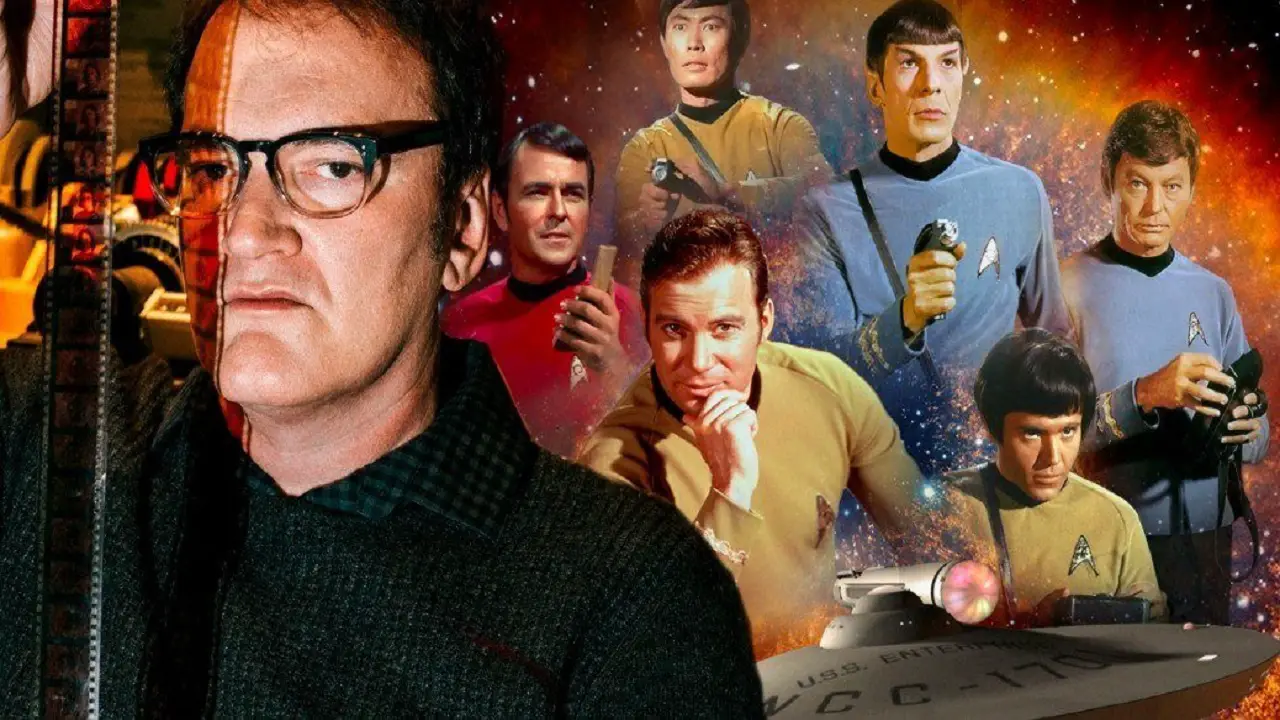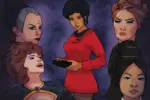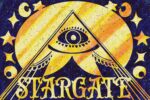You don’t have to be a huge sci-fi fan to understand that Gene Roddenberry’s “Star Trek” is a significant pop culture phenomenon, beginning with “The Original Series” that aired on television during the late sixties, a show that starred William Shatner as the smug and charming Captain James T. Kirk and Leonard Nimoy as science officer Spock. The series was recently given the blockbuster treatment by producer J.J. Abrams in a trilogy of releases with Chris Pine in the captain role and Zachary Quinto as his Vulcan counterpart, films that turned out to be box office successes, for the most part. With the new television show “Star Trek: Discovery” on CBS drawing criticism from fans and critics for its darker, more somber frontier, it’s not surprising to hear that many are skeptical about Quentin Tarantino’s interest in the franchise.
Wait a minute…did I hear that right? Quentin Tarantino, the legendary “Pulp Fiction” and “Kill Bill” filmmaker known for bloody-good fight scenes and gruesome interrogation techniques wants to take on a fun-for-the-whole-family science fiction franchise, one that has never rated higher than PG-13 in theaters? Yes, it’s both true and fascinating. Not only is he interested in doing a movie, he insists that it be an R-rated film if it happens. While this may sound like a “highly illogical” idea, there are actually a few reasons why it could be exciting news for the “Star Trek” universe.
First off, Tarantino is a big fan of “Star Trek,” especially “The Original Series” and William Shatner, in particular. In a 2015 podcast with “The Nerdist,” Tarantino explains that he enjoyed seeing Chris Pine and Zachary Quinto in J.J. Abrams’ 2009 reboot, but wasn’t thrilled about the 2013 follow-up, “Star Trek: Into Darkness.” One of his issues has to do with the casting of Captain Kirk’s archenemy, Khan, a character whose treatment in the film was also controversial with fans. Khan Noonien Singh is a genetically engineered villain from “The Original Series” and the much-loved “Star Trek II: The Wrath of Khan” movie, the latter of which has continued to top readers’ polls and rankings for the best “Star Trek” movie of all time.
When asked what he would do with a “Star Trek” movie, Tarantino offers the idea that there are many excellent “Star Trek” episodes from the television series that provide opportunities for adaptation, such as his favorite from “The Next Generation” series that aired during the late eighties and early nineties. The episode from the third season is called “Yesterday’s Enterprise” and involves time travel as the crew encounters another ship from the past. Tarantino sounds enthusiastic about revisiting complex scenarios, like this one from the “Star Trek” canon, where there are many questions that have been left unanswered.
The director’s insistence that the new “Star Trek” installment should be R-rated also opens a whole new world of possibilities. While it’s a requirement that probably goes against the studio’s preference, since limiting the rating to PG-13 would maximize the audience attendance, fewer restrictions on the content allow the filmmaker to imagine a different kind of final frontier. Consider sci-fi films that were generally well received by critics over the past decade, such as Danny Boyle’s “Sunshine,” Neill Blomkamp’s “District 9” or, most recently, Denis Villeneuve’s “Blade Runner 2049.” These are movies that made full use of their R-rating while dealing in universes similar to that of “Star Trek,” including space missions, extraterrestrial races and ethical conundrums that the future may bring. Giving Tarantino free rein in this realm is understandably important, especially since the filmmaker has only focused on R-rated films thus far. However, there is much worry that a dark and gritty “Star Trek” is tough to succeed at when it doesn’t have enough classic Trek optimism. Perhaps the mixed feelings about the current “Discovery” series is proof of that challenge.
Looking back at the films on Tarantino’s resume, he has found success both writing and directing nearly all of his movies. The two Oscars he’s won include Best Screenplay Written Directly for the Screen, for “Pulp Fiction,” and Best Original Screenplay, for “Django Unchained,” a remarkable feat for a filmmaker in that capacity. Despite this, he’s only on board to potentially direct but not to write this new “Star Trek” installation. According to “Deadline,” Mark L. Smith, who wrote “The Revenant” and “Vacancy,” is the leading choice from a group of potential writers. Performing as only the director for this new sci-fi endeavor is uncharted territory for Tarantino, where the cinema icon might have the chance to really focus on taking the helm of the project while his vision is put on paper by another writer.
Of course, producer J.J. Abrams will also have a hand in this project if it actually comes to fruition. As a producer and director, he successfully rebooted the whole “Star Trek” universe back in 2009 and most recently has taken on “Star Wars” as well. Overseeing these two monumental franchises for the cinema is perhaps one of the biggest tasks that a filmmaker could ever imagine taking on, so it’s safe to say that Tarantino will have help from the fellow filmmaker if he happens to need it. Combining the proven market-savvy Abrams with the larger-than-life character-development style of Tarantino could be a team that only a “Star Trek” project can bring together.
What else could make the idea of a Tarantino “Star Trek” exciting? How about Patrick Stewart returning in any sort of capacity as Captain Jean-Luc Picard? Stewart starred in “The Next Generation” for seven seasons and is often named as one of the best-ever “Star Trek” captains. He told “The Hollywood Reporter” that he would return to reprise the role of Picard just to get the chance to work with the “Pulp Fiction” director. “One of my dreams is to work with Tarantino,” he said. “I admire his work so much, and to be in a Tarantino film would give me so much satisfaction.”

















